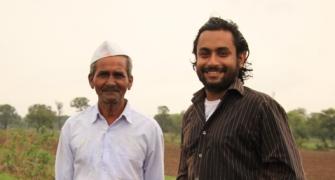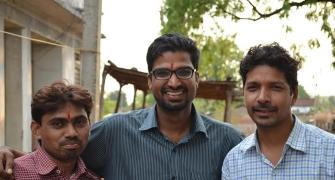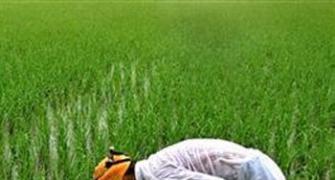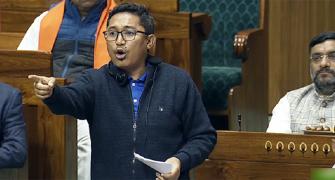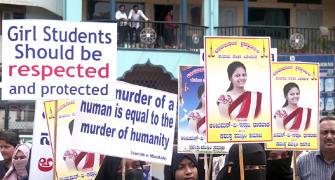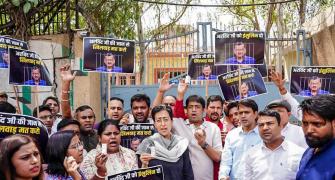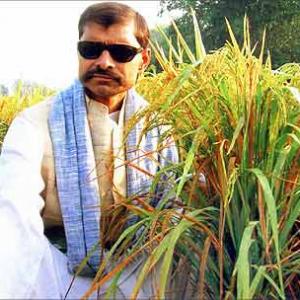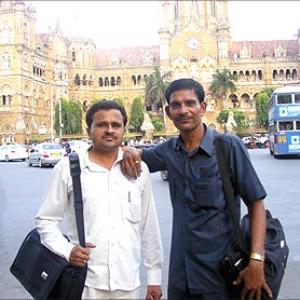Potshangbam Devakanta from Manipur shows the way in conserving the biodiversity of the state, farming around 100 traditional varieties of paddy and rare medicinal plants, finds Manu A B/Rediff.com.

When farmers across India are grappling with weather woes and poor yields, Potshangbam Devakanta from Manipur has succeeded in adopting smart and eco-friendly methods of farming to ensure his harvest is satisfactory year after year.
Like thousands of farmers in India, 60-year-old Devakanta too toils in the paddy fields for long hours.
What makes him different from other farmers is his passion to conserve a wide variety of rice in his organic farm, including a black rice variety with medicinal properties, called ‘chakhao poireiton’, and other drought-resistant varieties. Chakhao poireiton is rich in antioxidants that are said to prevent cancer.

He has so far succeeded in preserving 100 traditional varieties of paddy and is cultivating 25 varieties of rice in his lush green farm.
Despite India being one of the world’s biggest producers of rice, little is known about the rich variety of rice that is grown across the country.
Manipur has a treasure trove of rice varieties, which can be grown in other states, which too face vagaries of nature.

Devakanta, who won the PPVFRA (Protection of Plant Varieties And Farmers Rights Act) conservation award in 2012, also cultivates five varieties of the rare and highly nutritious variety of black rice, called ‘chakhao poireiton’.
He has travelled all over Manipur, collecting different types of rice – from drought-resistant white rice (crop which needs less water), brown rice and black rice. Manipur is famous for black rice, which has several medical properties as well.
“In Manipur, farmers grow about 20 varieties of black rice and chakhao poireiton is the best variety.
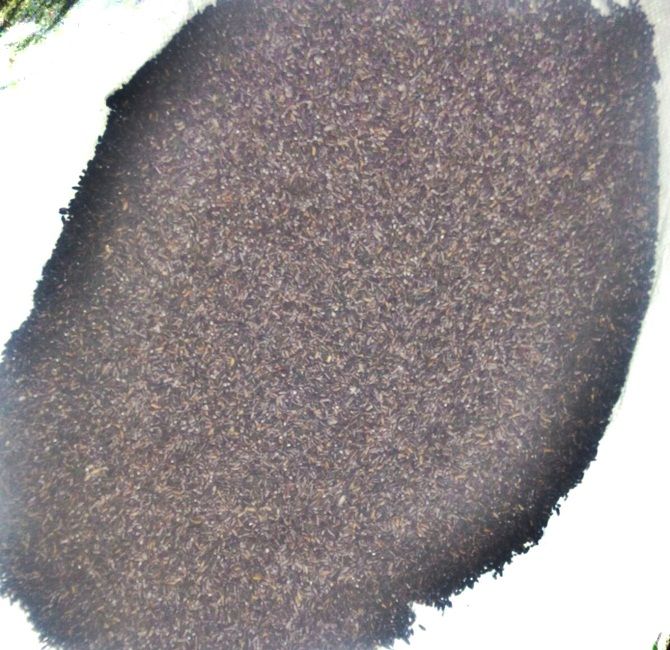
"It has a relatively high mineral content, including iron and amino acids. There are several cases where even cancer patients got cured by having this black rice,” says Devakanta.
Devakanta is currently working with about 200 farmers to increase the cultivation of chakhao poireiton in their farms as well. He inspires other Manipuri farmers to grow this rare rice.
“I am recommending chakhao poireiton to cancer patients who seek my advice. Considering the high prices of allopathic drugs which also have terrible side effects, it is advisable to have black rice," says Dr Anjali Pathak, naturopath and organic consultant.
"Black rice, ayurvedic medicines and organic food can lead to a complete cancer cure,” she claims.

The rice is also good to fight dieases like viral fever, dengue, chikungunya or influenza.
While some e-commerce sites sell black rice for Rs 300-350 a kg, Devakanta sells organically grown black rice from his farm for just Rs 150.
“I have adopted organic methods of farming. I have also succeeded in convincing many farmers to switch to organic farming. It’s high time we stopped using harmful insecticides and fertilisers. The soil here is very fertile and it is our duty to maintain by using only natural manures and bio-agents to protect the crop,” explains Devakanta.
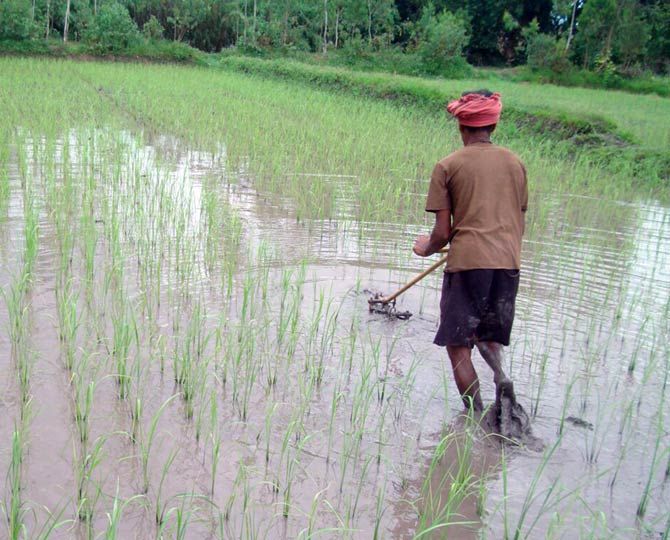
Many people know Devakanta runs an organic farm and come to him to buy different varieties of rice. However, if he gets the organic certification, he can package the rice better and sell it for a higher price.
“I don’t have the money to get an organic certification done. I don’t look at the profit aspect. I am more focused on how I farm. Now people who know me buy from my farm. Manipur is one of the few states in India where there is great awareness among people to curb the use of chemicals and fertilisers,” says Devakanta.
There are groups formed by local people who charge a penalty if anyone is found using chemical fertilisers in some districts.

“Traditional methods of farming do not give much yield. From a hectare, I get just two-three tonnes of rice every year. However, the produce is high on nutritional value and ensures people who consume it are healthy and have a longer life span," explains Devakanta.
Manipur is a hilly area and farming is done at different altitudes and most villages are not connected by motorable roads.
Most of the time, Devakanta and his assistants walk for two-three days to reach the villages to collect plants and seeds of indigenous crops.

Besides infrastructural issues, there is also the threat from militant groups who can harass the workers. “I was once caught by militants who demanded money. Luckily they let me go after I convinced them that I am a farmer,” says Devankanta.
Farmers like Devakanta need a proper go-down to store the rice, machinery to clean and sort the rice, packaging machine, computers to keep stock of the inventory, cameras to document the rice varieties and medicinal plants for the benefit of researchers, funds to train the farmers in better methods of organic farming and plant protection.
An e-commerce site to sell his products would have helped farmers like him get good exposure too.
 “Several farmers will stop growing their unique rice varieties unless they have an incentive to grow it on a large scale. Therefore, Devakanta has turned into a small scale entrepreneur to encourage these small farmers to continue growing their indigenous rice varieties. He buys the harvested rice from small farmers and is willing to supply it in bulk to buyers in any part of India,” says Anjali pathak.
“Several farmers will stop growing their unique rice varieties unless they have an incentive to grow it on a large scale. Therefore, Devakanta has turned into a small scale entrepreneur to encourage these small farmers to continue growing their indigenous rice varieties. He buys the harvested rice from small farmers and is willing to supply it in bulk to buyers in any part of India,” says Anjali pathak.
Devakanta and many farmers like him are looking for support to sustain agriculture.
“The government is not doing enough to promote agriculture. Farmers who do organic farming should be given more incentives. Scientists too must work towards growing better varieties of paddy and other crops so that the weather will not spread havoc on crop yield,” says Devakanta.
Devakanta also cultivates one of the hottest varieties of chilli called ‘Bhut jolokia’. It is grown in Assam and Nagaland as well but the Manipuri chilli is considered to be better.

Though there is a good demand for this chilli, Devakanta needs funds to buy a sturdy drier to dry the 'bhut jolokia' chilis during the peak season.
Devakanta is also conserving medicinal plants of Manipur. He runs an NGO called All Manipur Medicinal and Aromatic Plant Growers’ Consortium.
“We have several high medicinal value plants, some of which are good to cure cancer. Several aromatic plants can be used as inset repellents also. It is difficult to grow and maintain medicinal plants. Our nature is blessed with plants that can save us from several ailments. It is important to protest our naturally available medicinal plans before many varieties get extinct,” says Devakanta.
“Devakanta’s major challenge is to find a place to store harvested rice and spices, dry them, clean and grade it according to the quality. With proper infrastructure in place, Devakanta can provide employment to a few locals and also bring Manipur on the organic map of India,” says Anjali Pathak.
If you want to know more about Devakanta’s initiatives, you can reach him at 09862565030 / 09774269517.

